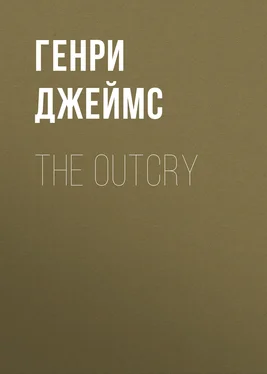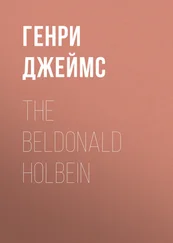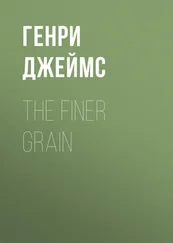Генри Джеймс - The Outcry
Здесь есть возможность читать онлайн «Генри Джеймс - The Outcry» — ознакомительный отрывок электронной книги совершенно бесплатно, а после прочтения отрывка купить полную версию. В некоторых случаях можно слушать аудио, скачать через торрент в формате fb2 и присутствует краткое содержание. Жанр: foreign_antique, foreign_home, visual_arts, на английском языке. Описание произведения, (предисловие) а так же отзывы посетителей доступны на портале библиотеки ЛибКат.
- Название:The Outcry
- Автор:
- Жанр:
- Год:неизвестен
- ISBN:нет данных
- Рейтинг книги:5 / 5. Голосов: 1
-
Избранное:Добавить в избранное
- Отзывы:
-
Ваша оценка:
- 100
- 1
- 2
- 3
- 4
- 5
The Outcry: краткое содержание, описание и аннотация
Предлагаем к чтению аннотацию, описание, краткое содержание или предисловие (зависит от того, что написал сам автор книги «The Outcry»). Если вы не нашли необходимую информацию о книге — напишите в комментариях, мы постараемся отыскать её.
The Outcry — читать онлайн ознакомительный отрывок
Ниже представлен текст книги, разбитый по страницам. Система сохранения места последней прочитанной страницы, позволяет с удобством читать онлайн бесплатно книгу «The Outcry», без необходимости каждый раз заново искать на чём Вы остановились. Поставьте закладку, и сможете в любой момент перейти на страницу, на которой закончили чтение.
Интервал:
Закладка:
Well, clearly, she might put it as she liked—it all came back to his being more charmed. “Heaven knows I’ve wanted a chance at you, but what should you say if, having then at last just taken you in in your so apparent perfection, I should feel it the better part of valour simply to mount my ‘bike’ again and spin away?”
“I should be sure that at the end of the avenue you’d turn right round and come back. You’d think again of Mr. Bender.”
“Whom I don’t, however, you see—if he’s prowling off there—in the least want to meet.” Crimble made the point with gaiety. “I don’t know what I mightn’t do to him—and yet it’s not of my temptation to violence, after all, that I’m most afraid. It’s of the brutal mistake of one’s breaking—with one’s priggish, precious modernity and one’s possibly futile discriminations—into a general situation or composition, as we say, so serene and sound and right. What should one do here, out of respect for that felicity, but hold one’s breath and walk on tip-toe? The very celebrations and consecrations, as you tell me, instinctively stay outside. I saw that all,” the young man went on with more weight in his ardour, “I saw it, while we talked in London, as your natural setting and your native air—and now ten minutes on the spot have made it sink into my spirit. You’re a case, all together, of enchanted harmony, of perfect equilibrium—there’s nothing to be done or said.”
His friend listened to this eloquence with her eyes lowered, then raising them to meet, with a vague insistence, his own; after which something she had seen there appeared to determine in her another motion. She indicated the small landscape that Mr. Bender had, by Lady Sandgate’s report, rapidly studied and denounced. “For what do you take that little picture?”
Hugh Crimble went over and looked. “Why, don’t you know? It’s a jolly little Vandermeer of Delft.”
“It’s not a base imitation?”
He looked again, but appeared at a loss. “An imitation of Vandermeer?”
“Mr. Bender thinks of Cuyp.”
It made the young man ring out: “Then Mr. Bender’s doubly dangerous!”
“Singly is enough!” Lady Grace laughed. “But you see you have to speak.”
“Oh, to him , rather, after that—if you’ll just take me to him.”
“Yes then,” she said; but even while she spoke Lord John, who had returned, by the terrace, from his quarter of an hour passed with Lady Imber, was there practically between them; a fact that she had to notice for her other visitor, to whom she was hastily reduced to naming him.
His lordship eagerly made the most of this tribute of her attention, which had reached his ear; he treated it—her “Oh Lord John!”—as a direct greeting. “Ah Lady Grace! I came back particularly to find you.”
She could but explain her predicament. “I was taking Mr. Crimble to see the pictures.” And then more pointedly, as her manner had been virtually an introduction of that gentleman, an introduction which Lord John’s mere noncommittal stare was as little as possible a response to: “Mr. Crimble’s one of the quite new connoisseurs.”
“Oh, I’m at the very lowest round of the ladder. But I aspire!” Hugh laughed.
“You’ll mount!” said Lady Grace with friendly confidence.
He took it again with gay deprecation. “Ah, if by that time there’s anything left here to mount on! ”
“Let us hope there will be at least what Mr. Bender, poor man, won’t have been able to carry off.” To which Lady Grace added, as to strike a helpful spark from the personage who had just joined them, but who had the air of wishing to preserve his detachment: “It’s to Lord John that we owe Mr. Bender’s acquaintance.”
Hugh looked at the gentleman to whom they were so indebted. “Then do you happen to know, sir, what your friend means to do with his spoil?”
The question got itself but dryly treated, as if it might be a commercially calculating or interested one. “Oh, not sell it again.”
“Then ship it to New York?” the inquirer pursued, defining himself somehow as not snubbed and, from this point, not snubbable.
That appearance failed none the less to deprive Lord John of a betrayed relish for being able to displease Lady Grace’s odd guest by large assent. “As fast as ever he can—and you can land things there now , can’t you? in three or four days.”
“I dare say. But can’t he be induced to have a little mercy?” Hugh sturdily pursued.
Lord John pushed out his lips. “A ‘little’? How much do you want?”
“Well, one wants to be able somehow to stay his hand.”
“I doubt if you can any more stay Mr. Bender’s hand than you can empty his purse.”
“Ah, the Despoilers!” said Crimble with strong expression. “But it’s we ,” he added, “who are base.”
“‘Base’?”—and Lord John’s surprise was apparently genuine.
“To want only to ‘do business,’ I mean, with our treasures, with our glories.”
Hugh’s words exhaled such a sense of peril as to draw at once Lady Grace. “Ah, but if we’re above that here , as you know–!”
He stood smilingly corrected and contrite. “Of course I know—but you must forgive me if I have it on the brain. And show me first of all, won’t you? the Moretto of Brescia.”
“You know then about the Moretto of Brescia?”
“Why, didn’t you tell me yourself?” It went on between them for the moment quite as if there had been no Lord John.
“Probably, yes,” she recalled; “so how I must have swaggered!” After which she turned to the other visitor with a kindness strained clear of urgency. “Will you also come?”
He confessed to a difficulty—which his whole face begged her also to take account of. “I hoped you’d be at leisure—for something I’ve so at heart!”
This had its effect; she took a rapid decision and turned persuasively to Crimble—for whom, in like manner, there must have been something in her face. “Let Mr. Bender himself then show you. And there are things in the library too.”
“Oh yes, there are things in the library.” Lord John, happy in his gained advantage and addressing Hugh from the strong ground of an initiation already complete, quite sped him on the way.
Hugh clearly made no attempt to veil the penetration with which he was moved to look from one of these counsellors to the other, though with a ready “Thank-you!” for Lady Grace he the next instant started in pursuit of Mr. Bender.
V
“Your friend seems remarkably hot!” Lord John remarked to his young hostess as soon as they had been left together.
“He has cycled twenty miles. And indeed,” she smiled, “he does appear to care for what he cares for!”
Her companion then, during a moment’s silence, might have been noting the emphasis of her assent. “Have you known him long?”
“No—not long.”
“Nor seen him often?”
“Only once—till now.”
“Oh!” said Lord John with another pause. But he soon proceeded. “Let us leave him then to cool! I haven’t cycled twenty miles, but I’ve motored forty very much in the hope of this , Lady Grace—the chance of being able to assure you that I too care very much for what I care for.” To which he added on an easier note, as to carry off a slight awkwardness while she only waited: “You certainly mustn’t let yourself—between us all—be worked to death.”
“Oh, such days as this—I” She made light enough of her burden.
“They don’t come often to me at least, Lady Grace! I hadn’t grasped in advance the scale of your fête,” he went on; “but since I’ve the great luck to find you alone—!” He paused for breath, however, before the full sequence.
Читать дальшеИнтервал:
Закладка:
Похожие книги на «The Outcry»
Представляем Вашему вниманию похожие книги на «The Outcry» списком для выбора. Мы отобрали схожую по названию и смыслу литературу в надежде предоставить читателям больше вариантов отыскать новые, интересные, ещё непрочитанные произведения.
Обсуждение, отзывы о книге «The Outcry» и просто собственные мнения читателей. Оставьте ваши комментарии, напишите, что Вы думаете о произведении, его смысле или главных героях. Укажите что конкретно понравилось, а что нет, и почему Вы так считаете.












